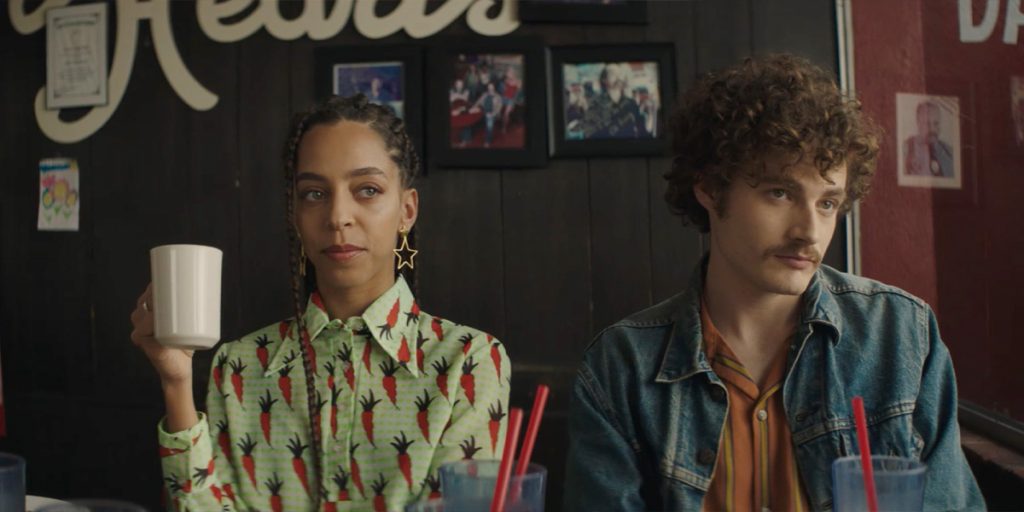Hayley Law and Ben Rosenfield shine in Mark, Mary & Some Other People, portraying a couple who navigates the uncharted waters of “ethical non-monogamy”, and overcomes many challenges in the way.
Mark (Ben Rosenfield, of Mrs. America) is the kind of guy who asks Siri for food calorie advice. Though he thas a tendency to ramble on and he invents objects of questionable efficacy for a living, he’s a nice guy who wears his heart on his sleeve. Mary (Hayley Law, of Spontaneous) is both brutally honest and incredibly sweet. Ironic, spontaneous and open-minded, she may not have the most conventional job but she has plenty of personality and a very cool attitude. Mark and Mary went to college together, but their first real meeting happens years later, at a drug store, where the former is attempting to make a choice between Doritos and Fritos and the latter is buying a pregnancy test that “isn’t for [her]”, though, really, it is. Needless to say, Mark sticks around for moral support, and, though the test is negative, sharing this unusual experience quickly brings our two leads closer to one another, and they end up dating and falling in love.
“One year-ish later”, our unconventional couple gets married, with the bride and groom sporting matching tattoos and a loved-up look in their eyes. But just when their romance seems to have reached its peak, Mary asks Mark to try “ethical non-monogamy“, and everything changes. Taking inspiration from a conversation she had with a friend, Mary suggests that both partners sleep with other people, creating their own version of an open relationship according to their own ideas of what should and should not be allowed.
But Mark’s views are less progressive, and questions are raised on what should be the right way to approach this sensitive topic. Are Mark’s traditional views making him too narrow-minded or is Mary the one who’s too forward? Is Mark overreacting or is Mary seeking from others what she should be trying to find within her own relationship? Mark, Mary & Some Other People invites us to ponder about the ethics of relationships, societal expectations and more timely topics, by taking us on a journey with two likeable leads who are trying their best to live their lives to the fullest while keeping their relationship alive.
Mark, Mary & Some Other People is the second feature-length film for director Hannah Marks (co-who co-directed After Everything and starred in I Used to Go Here andThe Runaways, among other titles), who also wrote and produced the movie. Recently named by Rolling Stone one of their 25 Under 25 artists changing the world, the filmmaker shows an assured sense of direction, and explores complex dynamics in a raw, intimate way. Mark and Mary’s relationship is explored through hand-held camera movements, incredible attention to detail and dialogue that brims with authenticity. The film’s consistent sense of style comes through in its cinematography (Casey Stolberg, of Trellis), music (Patrick Stump, of Big Hero 6) and sound design, with retro title cards, gorgeous desaturated colours, catchy tunes and on-point musical cues that make the film both immersive and enjoyable.

Though Mark, Mary & Some Other People is undoubtedly effective on a visual and technical level, it’s Ben Rosenfield and Hayley Law‘s portrayals of Mark and Mary that make the film so effective at reeling us in. From the movie’s first scene till its touching ending, Rosenfield and Law demand our attention, ensuring their characters are always relatable and human. Even when the screenplay isn’t at its best, the two leads know exactly when to be restrained and when to show outbusts of emotion, ensuring we are always attuned with Mark and Mary’s everchanging, often contrasting feelings.
If Marks’ drama shines in many ways, it’s also, unfortunately, a missed opportunity. This might have to do with the fact that the director wanted to tell a story about a subject – the idea of an open relationship – that she “knew was something that wasn’t for [her]”. The result is a film that certainly makes us think of our own views of relationships and romance, but that doesn’t always answer the questions it raises. True, we certainly find out now non-monogamy affects Mary and Mark’s lives, and just how hard a toll it has on their relationship, but what remains unclear is what exactly prompted Mary to suggest having an open relationship in the first place, and Mark to ultimately go along with her plan. Not only does this make the film’s investigation of the subject less in-depth than it could have been, but it also gives us two protagonists who are definitely likeable and charming, but who are also not always well-rounded enough to really leave a mark.
Another aspect that isn’t always effective is the film’s use of irony, especially in those scenes where it’s painfully obvious that the humor is neither necessary for character development nor successful at providing comic relief. Among the least effective attempts to use irony are are some unwittingly cringe-worthy moments involving Mary, such as her obsession with finding irreverent names for her band that range from “Unnecessary Colonoscopy” to “Biological C*ck”, or the way she ends up doing voiceover for “menopause vaginal dryness” commercials. The most out-of-character moment of all is a scene where Mary seems to be completely unaware of how gynecologic visits work, and appears to be unable to even understand the idea of “scooting down” on the medical bed. Oftentimes, these scenes feel incongrous and out of place, tarnishing our idea of the character, which is a shame. Keeping in mind the film’s otherwise clever script, all of this could have been sacrificed in favour of better characterisation and a more in-depth exploration of ethical non-monogamy.
Marks’ attempt to subvert gender clichés is admirable, and evident in certain aspects of the film: for instance, it’s Mark, and not Mary, who is initially nervous about the couple’s arrangement, which is a refreshing change of perspective in an industry that usually shows women as the “weakest link” in the relationship. When Mark confronts her about it, he accuses her of being “too woke”, cleverly making us wonder about the level of “wokeness” one should have in a relationship. When Mark and Mary are defining the rules of their open relationship, Mary speaks about “people who identify as men” and “people who identify as women”, teaching us about gender identity. These are just a few examples of how sensitive Marks’ script is, yet there also moments where the film’s dialogues and situations become quite clichéd – for instance, when Mary and Mark talk to their respective friends about their better halves, to the point that I’m not even sure the film would pass the Bechdel test.
Perhaps Mark, Mary & Some Other People‘s real flaw is that it attempts to be too many things at once, and ends up, at times, sacrificing an in-depth exploration of its compelling premise and likeable characters in favour of highly foreshadowed turns of events and ineffective moments of irony. That said, the film is still impressive on a technical level, and it’s bound to captivate audiences with its delicate portrayal of a modern relationship, whose protagonists are brilliantly brought to life by the film’s talented leads.
Mark, Mary & Some Other People premiered at the Tribeca Film Festival on Thursday, June 10, 2021 and is now available to watch on digital and on demand.

